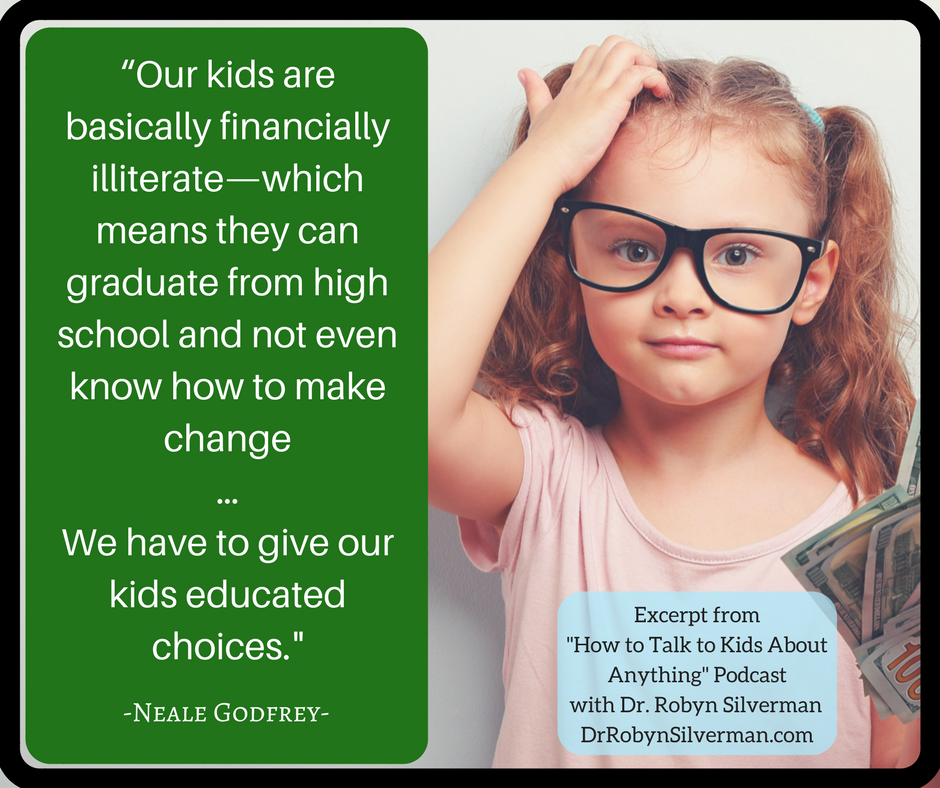Podcast: Play in new window | Download
Subscribe: Apple Podcasts | RSS | More
How to talk to Kids about Money
This podcast will focus on the talking to kids (and teaching kids) about money. Raising children who understand money is vital to their future financial health, independence and future fiscal behavior. Children and teens need to learn the value of money as well as how to budget, plan, earn, save, invest and give to causes and charities that mean something to them. Money management is a life skill that all children must learn—so let’s get the information we need right here!
Special Guest: Neale Godfrey
Neale S. Godfrey is an acknowledged expert on family finance and a New York Times #1 Best Selling Author of 27 books including  Money doesn’t grow on trees: A parents guide to raising financially responsible children. In addition, she has designed financial literacy curricula and mobile gaming apps that have reached millions of families.
Money doesn’t grow on trees: A parents guide to raising financially responsible children. In addition, she has designed financial literacy curricula and mobile gaming apps that have reached millions of families.
Neale began her career with The Chase Manhattan Bank, joining as one of the first female executives, and later formed her own company, pioneering the topic of “Kids and Money” in the U.S. Her mission is to educate the entire family, from childhood through all stages of adulthood, about money. Neale currently contributes to Forbes.com and the Huffington Post. She also regularly speaks for large audiences and appears on television and radio. You can find out more about her at: Linked- Neale Godfrey, Facebook Greenstreetscommon.com. Greenstreets- app. And Shmutzhappens.
This Podcast Provides:
- Tips:
- How to help our kids responsibly understand, save, spend and donate money.
- How to run a work-for-pay program vs citizens of the household chores in your home.
- What to pay for an allowance.
- How to create a chore chart and what chores to include.
- How to teach a budgeting habit.
- How to give teens a finite budget for expenditures
- Scripts: How to talk to our kids about giving, spending and savings.
- Steps: Steps for creating a savings/spending system.
Important Messages:
- Many children go into adulthood without knowing enough about money—many are financially illiterate.
- We want children to have a healthy attitude towards money.
- Money can be a wonderful part of life that can allow us to give to those in need and realize our dreams OR it can tear people
 apart and create stress if we have financial worries.
apart and create stress if we have financial worries. - It’s never too early or too late to start talking about money. When you hear “I want” you know its time to talk to them about money.
- There is no entitlement program here. You earn money. Nobody is going to hand you money.
- There are citizen of the household chores (behavioral) and work-for-pay (earn) chores.
- Kids learn to pick up their toys- which are citizen of the household chores, just as they learn to pick up trash on the sidewalk as a citizen of the community and recycle as a citizen of the world.
- Citizen of the household chores: Clean up your toys, make your bed.
- Work for pay: Dole out napkins. Put napkins into recycling. Set the table. Squeegee windows. Age-appropriate chores.
- Allowance: Work for pay. Money result of work.
- As children get older, more chores.
- Younger: Model behavior, you do it with them. Not punitive. They check off if they did it, you check it with them.
- Older: You model it, they do it on their own.
- Pay age per week for allowance, if possible.
- Chart on wall- they are responsible for doing it.
- Pick things that they don’t have to do it every day- if they have sports or homework that make it so they can only do it 2 times per week (i.e. feed the pet). Instead, water the plants, rake the leaves, take out the trash, shovel the snow.
- Model what happens in real life- they do work, they get money. They don’t do the work, they don’t get money. Nobody is going to hand you money each day.
- Budgeting is a habit. Piggybank makes it so you can’t see it. Makes sure the jars are clean.
- 4 jars: Charity jar (10%), quick cash (you set the parameters), medium term savings (pick a goal- save for it, little guys only save for a week or two), long term savings (put money away- take it to the bank- goal is college or a car or something large). Make it real.
- Charity: what is your child passionate about? Animals? Equal rights? This money can go towards projects that are meaningful.
- Long term savings: Not going to understand this right now. These are the rules. (Script: “You don’t understand why I want you to eat kale and spinach- but one day you will. You don’t understand why you have to hold my hand in the parking lot, but one day you will. You don’t understand why you have to put 30% in long term savings but one day you will.”)
- Lessons learned: When you spend your money on a crappy toy. Instead of disempowering your child and telling him/her what to buy and what not to buy, have them learn for themselves.
- Earn, save, spend and share—values that we want to learn. Pushing off instant gratification, saving for future, give to others. Then, give them freedom of choice. You are allowing them to learn. Don’t reward them monetarily.
- Allowance chart. Even young children understand that if they don’t feel the pets, they could die (listen to Neale’s story of her son talking about feeding the cats on Oprah). Have to do your chores if you want to get paid. The result of no work is no pay. Have to do it from start to finish.
- If you don’t do your citizens of the household chores- the result is behavioral. No monetary money.
- There may not be things that children don’t understand but you still need to teach them about certain money concepts and money rules.
- Give your children the opportunity to learn about money even if their choices aren’t always good ones!
- Teens: clothing allowance each quarter. Have them research it and record what they want to do.
- Insurance company talks to teen about car. Police officer talks to teens. Welcome to planet Earth. Debit card- per month budget.
- Emergency- of course you help. If they just blow all their money, they have to figure it out.
- If they want more money for clothes- give them an opportunity to make more money. Coupons.
- Greenlight: Debit card for kids. You have to greenlight it first.
- Emergency for adults- study that shows that some adults can’t cover a $400 emergency. Important to discuss.
- Don’t make money a big secret. If you keep money a secret- they’ll learn it from their friends! And their friends are bozos.
- Consequences of running up electric, water. Get them involved so they see it. Savings? Split them!
Notable Quotables:
- “Our kids are basically financially illiterate—which means they can graduate from high school and not even know how to make change…We have to give our kids educated choices…I saw my own kids not be able to handle money and I thought…I’ve got to do something about this. And so, I did!”
- “We want [our kids] to have a healthy attitude about money. We never want them to confuse net worth with self worth.”
- “The problem is we don’t have the script. So what I do, is open up the conversation and not have money be the biggest secret in the family and start talking about it and make it part of your daily routine.”
- “You are the CEO of your household so you get to choose what are “citizen of the household” chores and what are “work-for-pay” chores.
- “Money is only the result of work. It’s not for good behavior…It’s not if you get good grades. You don’t just get paid as a worker if you behave through the day… You earn it.”
- “Number 1: Don’t make money a big secret. Talk about it. Here’s our budget. This is what this costs…This is what we earn…if you keep it a secret, they’re gonna find out about money but they’ll find out from their friends…and you want to be the one who conveys the information.
- Number 2: Get them involved in real budgets…show them the electric bill…get them involved in the real way money works.”
- “Make sure your parenting reflects what happens in real life. Nobody is going to hand you money each day.”
- “Budgeting is a habit.”
- “It’s not really about money—it’s about values and life skills.”
Resources:
- www.nealegodfrey.com
- GreenStreetsCommon.com
- Linkedin & Facebook: Neale Godfrey
- GreenStreets App: https://itunes.apple.com/us/app/green%24treets-unleash-the-loot/id564402206?mt=8
- Shmootz happens: http://greenstreetcommons.com/gallery/shmootz-happens









